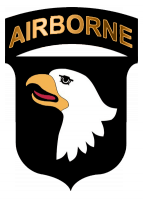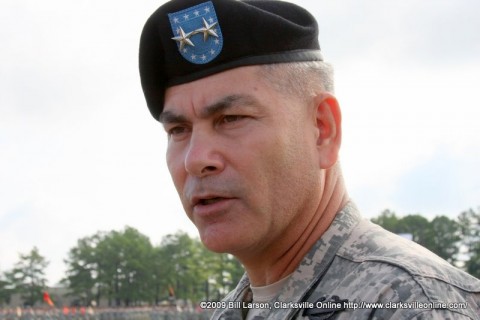Written by Sgt. 1st Class Kerensa Hardy and Sgt. Grant Matthes
101st Airborne Division The Fort Campbell Courier
 Afghanistan – In what was his final address to the Pentagon Press Corps from Afghanistan, the commander of Regional Command-East and Combined Joint Task Force-101 spoke about strides made over the last 12 months.
Afghanistan – In what was his final address to the Pentagon Press Corps from Afghanistan, the commander of Regional Command-East and Combined Joint Task Force-101 spoke about strides made over the last 12 months.
“It’s been a very, very exciting year here for Regional Command-East. We’ve been honored to serve with our Afghan partners for the past year,” Maj. Gen. John F. Campbell said Tuesday.
Campbell said he wanted to focus on transition of authority, realignment of forces and cooperation and coordination with Afghan security forces.
The 101st is nearing the end of its transition to the 1st Cavalry Division out of Fort Hood, Texas.

“Just like we had with the 82nd (Airborne Division) when we transitioned with them a year ago… Again, the Army does these transitions of authority at every level. We’ve been doing them for many, many years, so I think we got this down pretty well,” he said.
During the 101st’s command of RC-East, coalition and Afghan forces were realigned to places where they could be used more effectively. “We’ve added additional police over the course of the year,” the division commander said.
“We really do think we have a pretty good set now and that we have the right structure: the right Afghan forces, the right Coalition Forces, the right leadership and the right strategy. And we’ve seen great progress every single day; although some days are very frustrating – two steps forward, one step back – it is progress. And we’re very proud of our coalition partners and of the Afghan partners.”
RC-East boasts more than 130 combined combat outposts and forward operating bases. Some have been closed and others have been improved. This is a process Campbell said every commander will continue to do during his tenure in Afghanistan. “But we feel pretty good about the set that we’re going to turn over to both the 1st Cavalry Division and our Afghan partners here.”
Campbell spoke highly of the cooperation and coordination with CJTF-101’s Afghan partners.
“Everything we’ve done over the past year has been ‘shohna ba shohna,’ shoulder to shoulder, with both the army, the police and the … Afghan border police. We’ve really worked at that hard, and I think we can really see the results over the past year,” he said. “We feel very good about where the Afghan National Security Forces are; [there’s] still a lot of work to be done, but we do think that we’re handing off a much better Afghan security force than we had a year ago. And that really is a lot of great work by the coalition partners but also by the Afghans themselves. They’ve really stepped up, and we really feel good about the future of Afghanistan, especially RC-East based on the performance to date.”
When speaking about Osama bin Laden, Campbell said, though bin Laden was an important figure to al-Qaida, he alone did not make the war on terrorism. “You know, in the short term, we have not seen a big impact on his death here in RC-East,” he said.
Campbell also spoke about the spring campaign, planned troop drawdown, Taliban attacks, reintegration, Pakistan military coordination and civilian casualties. Before ending his briefing, Campbell took a moment to express his gratitude to those back at home station.
“I’ve also got to say thanks to our Families back at Fort Campbell, the communities that help us out. They’ve been very, very good. And, you know, we’ve taken some huge losses here. Every single loss changes the life of many people back there,” said Campbell. “I carry these cards; I think many people have seen me carry these: 101st soldiers and the other brigades that are with the 101st here. And every one of these are a hero. And we can never forget the impact it’s had on their lives. We can never forget their sacrifice. We can never forget the sacrifice of their families. And we’ve got to do everything we can to take care of those families for the rest of their life. We owe that to them. And so we want to – we have to – be able to honor our fallen like that.”


